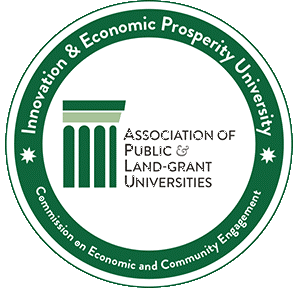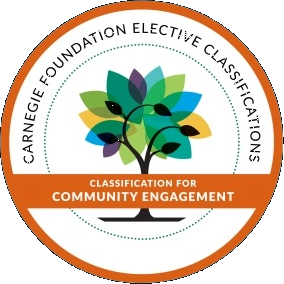August 17, 2020
Contact(s): Rex LaMore, lamore@msu.edu; Jennifer Bruen, bruenjen@msu.edu, (734) 837-4001; Carla Hills, hillsc@msu.edu, (517) 881-3009

The MSU Center for Community and Economic Development (CCED) has been awarded a $300,000 grant from the federal Economic Development Administration (EDA) to advance ongoing work that contributes to Michigan’s long-term economic recovery from COVID-19.
"This pandemic has had a profound effect on the economy, in Michigan and around the world, and illuminates the multiple stressors caused by a public health crisis," MSU President Samuel L. Stanley Jr., M.D., said. "Thanks to years of involvement by the CCED team, with their multi-disciplinary work and local engagement across the economic landscape, MSU can help communities meet the economic challenges brought about by the coronavirus and help them stabilize, recover and grow."
The monies are part of the supplemental appropriation from the Coronavirus Aid, Relief and Economic Security (CARES) Act passed by Congress in March. CCED was invited to apply based on a long history of collaborative projects and successful outcomes with the EDA that began in 1987.
"As Michiganders continue working together to navigate this unprecedented crisis, it has never been more important to invest in efforts that can help communities across the state not only recover, but also create sustainable, long-term economic growth," said Senator Peters, a member of the Senate Commerce, Science and Transportation Committee. "This federal funding that I helped secure through the CARES Act will ensure that students and faculty within the Regional Economic Innovation University Center can continue working to develop the solutions needed to move our state forward. I look forward to working with MSU in advancing innovative ideas that will strengthen communities across Michigan."
To earn the grant, CCED designed the Comprehensive Economic Recovery Initiative, a plan that provides education, technical assistance, research, and public-private partnerships in Michigan that foster vibrant economic ecosystems in four strategic areas:
- Resiliency Planning, to provide additional planning that can assist communities to speed recovery after experiencing a natural or manmade shock such as the novel coronavirus pandemic.
- Financial Resiliency, to make community capital investing more available, in collaboration with the Michigan Economic Development Corporation (MEDC), private financial institutions, state agencies and local governments, and others.
- Circular Economies, research, education, and planning that helps communities identify strategic resources to leverage the efficient use of local resources and supply chains. Ultimately, this facilitates the development of new jobs, innovative technologies, and increased economic activity.
- 21st Century Communications Infrastructure, to increase broadband and internet in rural and low-income urban communities that continue to experience a massive digital divide along with a wealth/health/education divide.
"Our work already brings us into the most distressed communities and regions, and it’s critical that we build resiliency to withstand future events that slow healthy economic activity, similar to the hard-hitting impacts of the coronavirus pandemic," said Rex LaMore, CCED director.
The initiative will be implemented by CCED assistant director Jennifer Bruen and a team of scholars and students at the MSU EDA University Center for Regional Economic Innovation (REI), created in 2011 by MSU CCED and funded by the U.S. Department of Commerce. Through the facilitation of the REI Network, a community of more than 2,000 individuals from the public and private sectors work toward turning vulnerable communities into economically vibrant places that encourage high-growth entrepreneurial development.
"This expansion fits right into our ongoing efforts to generate new knowledge and innovative strategies together and form collaborative partnerships that help communities succeed and thrive," said Bruen.
Visit reicenter.org or contact Jennifer Bruen at bruenjen@msu.edu for more information on how to get involved.









